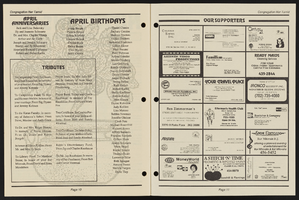Search the Special Collections and Archives Portal
Search Results

Virginia Houser interview, March 20, 1978: transcript
Date
Archival Collection
Description
On March 20, 1978, collector Karen Reed interviewed her grandmother, Virginia Houser (born on August 22nd, 1912 in Bartonville, Illinois) at her home in Las Vegas, Nevada. In the interview, Virginia Houser discusses working in Las Vegas at various stores as well as changes in the Downtown and Strip areas. She also speaks about the annual Helldorado Parade and other entertainment in the Las Vegas area besides gambling.
Text

Transcript of interview with Jack W. Zunino by Stefani Evans and Claytee White, August 30, 2016
Date
Archival Collection
Description
Landscape architect Jack W. Zunino is a Fellow of the American Society of Landscape Architects (ASLA) and president of the Society's local chapter. He has designed many of Southern Nevada's iconic landscapes: the Rio Hotel, the M Resort, the Desert Demonstration Gardens, the gardens at Ethel M. Chocolates, the Cactus Avenue overpass, and most notably, the Springs Preserve. He's also a third-generation Nevadan from Elko, grandson of Italian immigrants who met and married in the Silver State and raised their large family in that Nevada mining town. The product of Elko schools, he graduated from the University of Utah in psychology and Utah State University in landscape architecture while earning his tuition as a road construction laborer. In this interview, Zunino tells of his employment with G.C. Wallace Engineering and JMA architects before founding his own landscape architecture firm in 1989. He speaks to the importance of planners and landscape architects on Southern Nevada's conser
Text

Photographs of Desert Moon Motel sign, Las Vegas (Nev.), April 18, 2017
Date
Archival Collection
Description
Site name: Desert Moon Motel (Las Vegas, Nev.)
Site address: 1701 Fremont St
Sign owner: Jerzy and Celina Kosla
Sign details: The building was constructed in 1942 (Assessor). According to one commentator, the Desert Moon motel opened on the site in 1952 (Roadside Architecture.com). The cars on a vintage postcard of the motel appear to date from the late 1940's or early 1950's (Ebay). The same vintage postcard (Ebay) shows the motel as a member of United Motor Courts, an early motel referral chain founded in 1933 which published a travel guide until the early 1950's (Wikipedia). Based in Santa Barbara, California, United Motor Courts was made up of "a friendly group of independent owners of motor lodges..." (Historic Highways). The Quality Inn motel franchise was a spinoff of United Motor Courts (Wikipedia). The motel has been renovated by its current owner, Polish immigrant George (Jerzy) Kosla (Glionna, 2017).
Sign condition: The sign is Condition 4, good. The paint appears slightly faded but there is no flaking or peeling. The cabinets, reader boards, and fiberglass moon are all in good condition. The neon is intact.
Sign form: Pole sign
Sign-specific description: The sign pole and metal cabinets are painted pink. The design and lettering are the same on both sides of the sign. The trapezoid-shaped lower cabinet extends horizontally toward the street. It contains a rectangular white plastic lightbox which states "FREE ADULT MOVIES" in red sans serif letters and "FLAT SCREEN TV'S in smaller black san serif letters. To the left of the letters is the black silhouette of a female figure. On the metal below the plastic screen are clear sans serif neon letters which spell out, "NO VACANCY" in red when illuminated. The upper metal cabinet hangs from the street side of the pole. White painted san serif letters, covered by clear sans serif neon letters which glow red when illuminated, run vertically down the cabinet to spell out, "XXX MOVIES". Five metal cabinets attached to the street side of the sign run vertically to spell out, "M-O- T-E- L" in white painted sans serif letters covered by yellow sans serif neon letters. On top of the pole is a white p
Sign - type of display: Neon, Lightbox
Sign - media: Steel, Plastic, Fiberglass
Sign - non-neon treatments: Lightbox
Sign environment: East Fremont Street, surrounded by other motels.
Sign - date of installation: c. 1950s
Sign - date of redesign/move: The now pink or faded red sign cabinets were painted blue in a 2003 photograph
Sign - thematic influences: Desert, Space Age, Western
Sign - artistic significance: The current sign appears to have taken the Western/Lunar theme from the previous sign and transformed it into a 1950's/1960's Space Age/Lunar theme
Survey - research locations: Assessor's website
Survey - research notes: Ebay. Las Vegas NV Desert Moon Motel roadside Nevada vintage linen postcard ca 1940s. Retrieved from https://picclick.com/LAS-VEGAS- NV-Desert- Moon-Motel- Roadside-Nevada- 141923576051.html Glionna, J. M. (2017 April 23). Motel, once a haven, now a crime-ridden jungle in downtown Las Vegas. Las Vegas Review Journal. Retrieved https://www.reviewjournal.com/local/local-las- vegas/downtown/motel-once- a-haven- now-a- crime-ridden- jungle-in- downtown-las- vegas/ Historic Highways. (2007 July 14). Archive for the "Motel Associations" category: Looking for a motel in 1933. Retrieved from https://historichighways.wordpress.com/category/motel-associations/ Roadside Architecture. com (n.d.). Las Vegas Signs: Desert Moon Motel. Retrieved from http://www.roadarch.com/signs/nvvegas.html RoadsidPeek.com. (n.d.). Downtown motels Las Vegas: Desert Moon Motel. Retrieved from http://www.roadsidepeek.com/roadusa/southwest/nevada/vegas/lvmotel/lvdownmotel/index5.htm Wikipedia. (n.d.). Motel: 2.6 R
Survey - other remarks: A postcard circa early 1950's features a different sign with a saguaro cactus and quarter moon (Ebay). The current sign appears to have taken the Western/Lunar theme from the previous sign and transformed it into a Space Age/Lunar theme, which may indicate that the sign dates from the date from the late 1950's or 1960's.
Surveyor: Mitchell Cohen
Survey - date completed: 2017-08-22
Sign keywords: Neon; Steel; Plastic; Fiberglass; Pole sign; Light box; Sculptural
Mixed Content

Cristina Alano oral history interview: transcript
Date
Archival Collection
Description
Oral history interview with Cristina Alano conducted by Cecilia Winchell and Stefani Evans on September 9, 2022 for the Reflections: The Las Vegas Asian American and Pacific Islander Oral History Project. In this interview, Alano recalls a happy childhood in Pampanga, Philippines. After attending college for a banking and finance degree, she briefly worked at a bank before marrying her husband and immigrating to the United States. She would go on to move to Colorado where she lived for seven years, and finally moving to Las Vegas, Nevada in 2003. Alano recalls her first jobs in Las Vegas, including Walmart, SEI Electronics, a cashier at the Riviera, and finally the airport where works as a supervisor at Hudson as well as an assistant manager at Brighton. She discusses what she has done at each job and how she ended up getting involved with the Culinary Union in 2016. Since joining the union, she has done everything from being a shop steward to canvassing, most recently flying down to Georgia to help campaign for Senator Warnock. Throughout the rest of the interview, she discusses everything from food, to festivals, and her family.
Text
Katherine A. Spilde Papers on Native American Gaming
Identifier
Abstract
The Katherine A. Spilde Papers on Native American Gaming include materials collected by anthropologist Katherine Spilde about Native American gaming and the greater gaming industry. The materials date from 1789 to 2015, with the bulk of materials dating from 1995 to 2010. Materials dating from the eighteenth and nineteenth centuries are reproductions of key court opinions and treaties concerning Native American rights and sovereignty. The majority of the materials document Native American gaming following the passage of the 1988 Indian Gaming Regulatory Act (IGRA). The papers detail Native American gaming enterprises both on and off reservations, the socioeconomic impact of gaming, and the legislative history of Native American gaming in the United States. The papers include research and subject files created by Dr. Spilde during her employment with the National Gambling Impact Study Commission (NGISC), the National Indian Gaming Association (NIGA), and the Harvard Project on American Indian Economic Development (HPAIED). The collection includes socioeconomic reports; testimonies; correspondence; memos; press releases; photographs; audiovisual materials; promotional materials from casinos and tourist attractions; brochures; fact sheets; summaries; booklets; pamphlets; advertisements; tourism materials; journal articles; legal briefs; legislative documents; court opinions; Dr. Spilde’s notes; presentations; packets, agenda, schedules, and itineraries from conferences; periodicals; Native American and community newspapers; and newspaper articles. The collection includes materials about over one hundred federally recognized Native American nations. Also included are materials that document the socioeconomic impact of gaming, the international gaming industry, criminal activities related to gaming, advertising about gaming and casinos, lotteries, internet gaming, compulsive gambling, and bankruptcy as a result of gambling.
Archival Collection

Herman Jimerson, Ruth Jimerson-Carter, and Leon Carter Jr. oral history interview: transcript
Date
Archival Collection
Description
Herman Jimerson and his younger sister Ruth Jimerson-Carter, along with her husband Leon Carter Jr., gathered on March 3, 2021, to talk about their memories and experiences growing up in West Las Vegas—the Westside.
OH-03746 contains additional interviews with the Carter family that are not transcribed in this document. Contact special.collections@unlv.edu for more information.
Text

Transcript of interview with Pauleen Foutz by Don Scott Kaye, February 25, 1980
Date
Archival Collection
Description
Text

Kimberly and William King oral history interview: transcript
Date
Archival Collection
Description
Oral history interview with Kimberly and William King conducted by Claytee D. White on November 27, 2017 for the Remembering 1 October Oral History Project. In this interview, Kimberly and William King discuss the October 2017 mass shooting in Las Vegas, Nevada and their experiences from that day. They talk about attending the Route 91 Harvest festival and their struggle to find safety and obtain medical medical attention for William after he was shot. Kimberly describes her feelings regarding the city prior to the shooting and how her perspective on Las Vegas has changed. The couple finish the interview with a discussion of life after the shooting, especially in regards to love and community.
Text

Letter including Nevada Attorney General Opinion No. 123 from Harvey Dickerson to Thomas A. Campbell (Las Vegas), October 26, 1955
Date
Archival Collection
Description
Notwithstanding Section 6112 of the Public Service Commission Act, the Las Vegas Valley Water District was allowed to meter water to customers; Opinion No. 123.
Text

